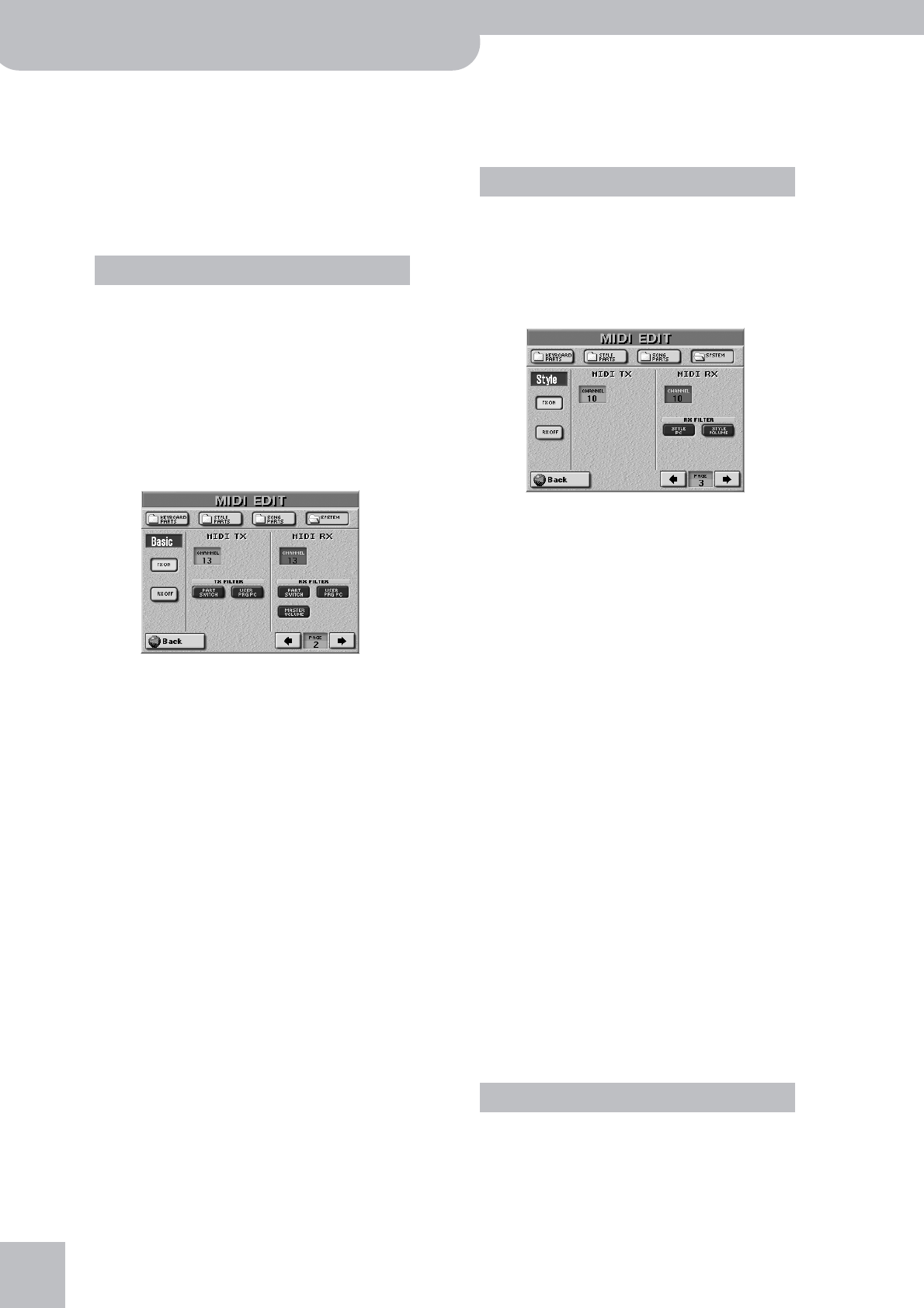
MIDI
218
r
G-70 Music Workstation
● Internal—The Recorder/sequencer (SONG) or Arranger
(STYLE) uses its internal tempo.
● MIDI—Song or Style playback can be started or stopped
with MIDI real-time messages (Start, Stop, Clock)
received from an external clock source.
● Remote—The Recorder/sequencer (SONG) or Arranger
(STYLE) waits for a start message to start playback at its
own tempo. When it receives a stop message, playback
stops. External clock messages are ignored.
The Basic channel is used to receive and transmit
Program Change and Bank Select messages for
selecting User Programs, as well as for the reception
and transmission of other kinds of messages that are
not directly related to a specific MIDI channel (such
as the PART SWITCH function, for example). Note
that if you select another channel, messages
intended for the BASIC parameters use might also
cause other parameters to change when you don’t
want them to.
■MIDI TX & TX FILTER
● CHANNEL—Use this parameter to assign a MIDI transmit
channel to the “Basic” channel. If you don’t want these
messages to be transmitted, switch off the [TX¥ON÷OFF]
field.
● PART SWITCH—Whenever you mute or un-mute a part
on the Mixer pages (Keyboard parts) or on the STYLE
MAKEUP TOOLS/VOLUME page, your G-70 sends an
NRPN message that describes your action. Filtering these
messages may be useful to keep your external sequencer
from recording them – or the receiving GS module from
muting the part assigned to that channel.
● USER PRG PC—This parameter is used to filter the trans-
mission of program change and bank select messages
related to User Program selection.
■MIDI RX & RX FILTER
● CHANNEL—Use this parameter to assign a MIDI receive
channel to the “Basic” channel. If you don’t want these
messages to be received, switch off the [RX¥ON÷OFF]
field.
● PART SWITCH—Whenever you mute or un-mute a part
on the Mixer pages (Keyboard parts) or on the STYLE
MAKEUP TOOLS/VOLUME page, your G-70 sends an
NRPN message that describes your action. You can keep
the G-70 from responding to such messages to avoid
that external instruments mute its parts.
● USER PRG PC—This parameter is used to filter the
reception of program change and bank select messages
relative to User Program selection.
● MASTER VOLUME—This parameter allows you to enable
or disable the reception of Master Volume messages that
would change the G-70’s overall volume. This is an
exclusive message common to all newer MIDI devices.
The STYLE channel is used for receiving and transmit-
ting program change and bank select messages that
select Styles, and volume messages that change the
Style’s volume. These two message types can only be
filtered in the RX column (i.e. you can specify
whether or not to receive them).
The MIDI address of a Music Style consists of three
elements: a CC00 number, a CC32 number, and a
program change number. The values assigned to
CC00 and CC32 define the Style, whereas the pro-
gram change number defines the pattern (Intro, End-
ing, etc.). See also the “Parameter Reference” booklet
supplied with your G-70.
Sending only a program change number selects
another pattern of the currently active Style. Be
aware, however, that only sending CC00 and CC32
messages (without a program change) has no effect.
Note: When you select another Style on your G-70, it trans-
mits a CC00-CC32-PC cluster on the Style channel, which you
could record using an external sequencer.
■MIDI TX
● CHANNEL—Use this parameter to assign a MIDI transmit
channel to the STYLE function. If you don’t want these
messages to be transmitted, switch off the [TX¥ON÷OFF]
field.
■MIDI RX
● CHANNEL—Use this parameter to assign a MIDI receive
channel to the STYLE function. If you don’t want these
messages to be received, switch off the [RX¥ON÷OFF]
field.
● STYLE PC—Program change and bank select messages
for Style selection. Switch this button icon off if the
G-70 must not select other Styles or patterns.
● STYLE VOLUME—Volume messages relating to the Music
Styles. Switch this button off if the G-70 must not
receive them.
NTA notes are only received from an external MIDI
instrument. What you play in the chord recognition
area of the keyboard to feed the Arranger is auto-
matically converted to the corresponding MIDI note
numbers, which are transmitted to external instru-
BASIC parameters
STYLE parameters
NTA: Note-to-Arranger


















